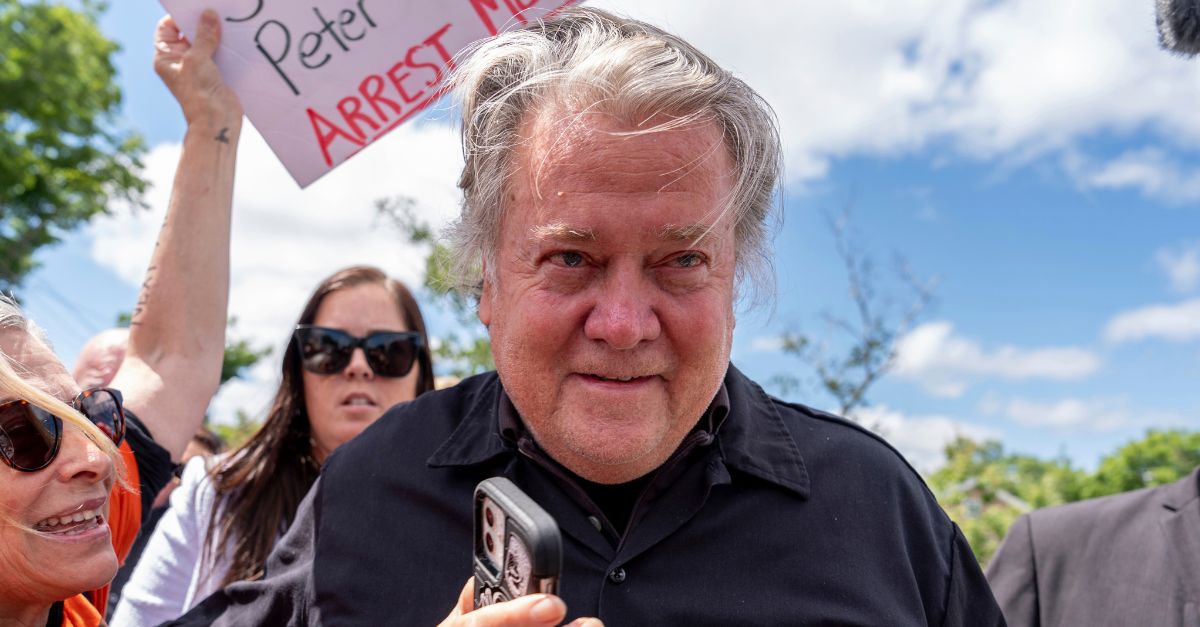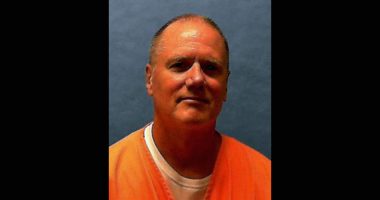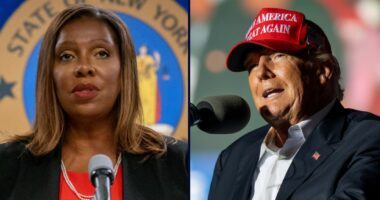
Steve Bannon arrives to speak outside Danbury Federal Correctional Institution, Monday, July 1, 2024, in Danbury, Conn. (AP Photo/Julia Nikhinson)
Federal prosecutors say that Steve Bannon must stay behind bars until the end of his sentence — and that his attempts to obtain an early release are without merit.
Bannon, a longtime Donald Trump ally and former White House strategist, was convicted in July 2022 of contempt of Congress for failing to respond to a subpoena from the since-dismantled House committee investigating the Jan. 6 Capitol attack. After multiple attempts to stay out of prison, including a plea directly to the U.S. Supreme Court, Bannon finally reported to federal prison on July 1 to serve his four-month sentence, which is scheduled to end on Oct. 29.
As Law&Crime previously reported, Bannon requested in August to either have bail reinstated or to get out of prison on supervised release. He argued that new “developments” and “significant events” warranted the change.
In a filing Thursday, prosecutors said Bannon’s arguments are fruitless.
“The defendant shows no basis for the Court to reverse its earlier ruling lifting the stay of his sentence, a ruling that both the D.C. Circuit and the Supreme Court have effectively endorsed,” the government’s opposition to Bannon’s release request said. “He also fails to justify modifying his sentence to impose a period of supervised release.”
Prosecutors reminded U.S. District Judge Carl Nichols, a Trump appointee, that he has already found that Bannon “fails to overcome the presumption of detention pending appeal,” and that he “has shown no reason why the Court should reverse its earlier ruling.”
The government noted that Bannon presented a “changed circumstances” argument, but doesn’t provide evidence or support for that claim.
“The defendant does not claim that there has been either a change in his circumstances or a change in the law,” the filing said. “Indeed, the only relevant new circumstances are that both the D.C. Circuit and the Supreme Court have agreed with the Court’s determination that the defendant does not merit release pending appeal.
A key argument on which Bannon’s lawyers relied — specifically, that a circuit judge’s change of heart on the meaning of a precedential ruling on which the circuit’s three-judge panel relied “establishes that his appeal raises a ‘substantial question”” — doesn’t hold up under scrutiny, the government lawyers said.
“[T]he defendant cites no authority, nor are we aware of any, suggesting that one judge’s dissent establishes a ‘substantial question,’” the filing says. “Moreover, the Bannon II majority was aware of Judge Walker’s dissent but nonetheless found that the defendant had not met his burden under the statute. Similarly, the Supreme Court knew the full history of this case — including Judge Walker’s dissent — yet found no basis to grant the defendant’s application for release pending appeal.”
Prosecutors also criticize Bannon’s effort to extract a particular interpretation of the fact that the D.C. Circuit has not yet decided whether to rehear his appeal en banc.
“There is no basis to conclude from the pendency of the defendant’s rehearing petition that it is ‘very likely’ the D. C. Circuit will either grant rehearing en banc or deny rehearing with a dissent,” the filing says. “The defendant shows no basis to assume that the D.C. Circuit is not simply dealing with a heavy workload after a summer recess and certainly offers no support for his speculation that he will receive rehearing en banc.”
“At bottom, the defendant’s attempt to ‘read tea leaves’ does not establish any basis for the Court to release a defendant whom this Court, the D.C. Circuit, and the Supreme Court have ruled must be detained,” the federal government adds.
Prosecutors also took aim at Bannon’s request for a sentence of supervised release — a request that they say Bannon has not earned.
“The defendant has not presented any ‘extraordinary and compelling reason’ to reduce his sentence,” prosecutors say (citations omitted). “Instead, the defendant argues that accommodation of his desire to receive ‘earned-time credit’ constitutes an ‘exception and compelling’ reason. This argument is footless.”
Have a tip we should know? [email protected]








